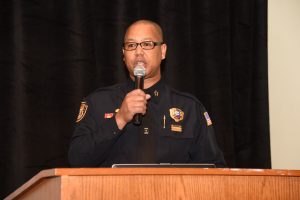
Former local reporter/anchor Dee Griffin said she thought domestic violence was something that happened to other people, until it happened to her.
Griffin, who now lives in Georgia, spoke to an audience of more than 250 people attending the Bridging Troubled Waters community event held Saturday at the University of Tennessee Health Science Center. The morning-long gathering was hosted by UTHSC, Memphis Crisis Center, Family Services and Zeta Phi Beta Sorority, Inc., to focus attention on the epidemic of domestic violence in Memphis and Shelby County, as well as to offer solutions for resolving conflicts peacefully and building healthy relationships.
“A lot of people say, ‘it’s not going to happen to me,’ ” said Griffin, who was the keynote speaker. “It happened to us. It can happen to you.”
She spoke candidly of how she met the man who would become her husband, fell in love, had a storybook romance and wedding, and gave birth to a son. The relationship soon turned to mental and verbal abuse, and eventually physical abuse, causing her to take her son and leave.
“I started thinking, ‘maybe it’s me.’ And eventually, I did what most victims do, I went back.” She used that mistake as a cautionary tale. “You’re going to have to get out,” she said. “But it’s up to you to make sure you don’t get back in it.”
In the end, Griffin left with her child, but lost everything. She had to rely on government assistance and help from family members for a time.
“It can happen to anyone. You can be a millionaire, it can happen to you. You can be the poorest of the poor, it can happen to you, but you can get out,” she said. “It’s up to you to say enough is enough.”
Griffin said she is thankful for those who helped her – family, friends, service providers and others. “Most women won’t call the police for themselves, but you have to do it. We have to take a stand. If you are in that situation, you have to get out.”
Domestic violence is destroying this country, but we have to stop it, she said. And it’s not just a women’s problem. Everyone has a role to play.
That was exactly the message of the event held from 9 a.m. to 1 p.m. in the UTHSC Student-Alumni Center. Breakout sessions, during which participants could get advice, support and resources, focused on topics including relationship health 101, trauma and suicide, family impact of domestic violence, healthy sexual boundaries and victim’s rights.

Memphis Police Department Director Michael Rallings spoke before Griffin took the podium, sketching out the scope of the domestic violence problem in the city. “There’s definitely a lot of work to do,” he said.
He said MPD has handled 12,830 domestic violence incidents this year. “Domestic violence doesn’t just affect those involved. It has immeasurable reach — children, coworkers, family, friends — all are victimized.”
District Attorney General Amy Weirich said domestic violence impacts everyone in this community, particularly children it touches. “We know that those children are 75 percent more likely to be abused or become abusers,” she said.
“Our goal is that one day our children won’t know what we mean by domestic violence.”
Bridging Troubled Waters will become an annual community event hosted by UTHSC. Next year, it will be held on October 28.
